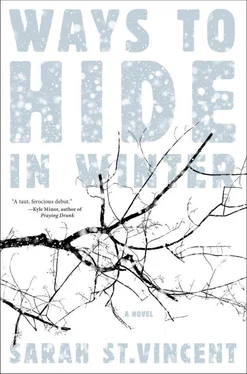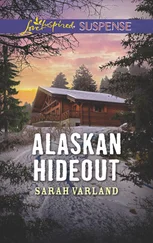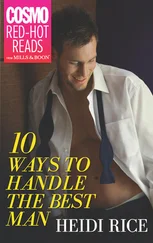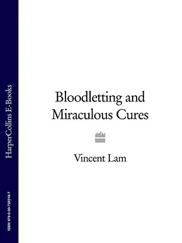I strode into Miller’s and glanced around at the shelves. The shop was dark, giving off the smell of newsprint and candy and the metal of the guns they sold in the back. The woman behind the counter looked from the TV to me without changing the angle of her body.
I approached the counter.
“I need a map,” I said.
“Pennsylvania?” the woman asked without interest. “Maryland? Eastern U.S.?”
I thought about it. “Eastern U.S.,” I told her. On the TV, there was a burst of laughter. Two women in an apartment in some city, thin and elegant even in their jeans, with pretty, swingy hair, were having an argument. The camera lingered on their faces as they circled around a coffee table, pointing at one another with manicured fingers.
I put my money on the counter and left.
Back in my grandmother’s kitchen, I dug for the box of tea I knew was lurking there and put the kettle on, watching the flame dance under the metal, losing myself in my thoughts. Then, leaning against the counter, I spread out the map—Florida Keys to New Brunswick, it said on the front—and traced the roads with a finger.
For a long time, I took in the patches of green that were forests, the hard-edged gray blots of cities, the brown dots that were mid-sized towns. Sipping my tea, I traced the roads with a fingertip, thinking without any resolution.
Then I folded the map and carried it up to my room, where I slid it under the mattress.
That night, I made shepherd’s pie for dinner but found I couldn’t eat it, dissecting it with my fork while my grandmother dug in. If nothing else, she had a healthy appetite.
I watched her for a time.
“Grandma,” I said finally.
“What?”
I fiddled with the silverware next to my plate. There was something I wanted to ask her, but I didn’t know how to ask it, or even exactly what it was. It had something to do with a sense that I was being watched, tested, judged for what I did in these hours. To my surprise, it came out as “Do you believe in God?”
She glanced up, a streak of mashed potatoes trailing along one cheek. “Do I believe in God?” Her tone was suspicious, as if she smelled a trick. She was wearing the flowered dress she only wore when I forgot to do the laundry.
I decided to stick with it. “Yeah.”
She considered the question, her mouth opening slightly as she chewed. “No, I don’t think I do. Why?”
“Did you ever?”
She pinched a corner of bread from the slice on her plate, pushing it through the pool of meat juices. “I guess so. At one time.”
“But you changed your mind.”
“Yeah.” She thought about it, the powdery skin of her brow crinkling. “I must’ve.”
“Was there a reason?”
“I don’t know.”
I studied her from across the table. “You still go to mass, though.”
“Yeah.” She shrugged her thin, bird-like shoulders. “Got to go somewhere. Why?”
“I don’t know. Never mind.”
We lapsed into silence. I imagined the stranger sitting on the edge of his cot, tense and worried, afraid to leave the room but just as afraid to stay in it. Standing up, pacing, fixing his gaze on the door, waiting for someone. The police. Someone like Jerry, with his long black gun. Me.
I closed my eyes.
“Your father had a sister,” my grandmother said suddenly.
I looked up at her. “Sure,” I said, wondering what had brought this up. “Aunt Jeanine.”
“No.”
I looked at her. She blinked back at me in her tortoise-like manner.
“Different sister,” she said. “Lulu.”
I eyed her warily. “I don’t have an Aunt Lulu.”
“You did. Before you were born. Long time before that.” A streak of gravy had found its way into her hair, causing one curl to droop. “She had problems.”
“What do you mean?”
“Problems,” she said again vaguely. “She didn’t develop right. She had problems in her brain. Seizures and other things.”
I knitted my fingers together, uncertain of what to say. “I…didn’t know that.”
She shook her head. “They talked me into giving her up. The county. They took her away. She died when she was three.” She looked down, aligning her fork and knife along the edge of her napkin. “Three years and five months. She never said a word. That’s what they told me.” Coughing, she covered her mouth. “That kind of thing used to happen back then. It’s not like now, when they can fix these things. Everything was different.” She coughed again and reached for her glass of milk.
“After they told me she died, I was just so tired. That’s when I stopped thinking about things like God, I guess. I just didn’t have the energy. It takes energy to believe in that kind of thing, that’s what I found out, and I didn’t have it. I was busy taking care of your dad by then. He was almost two.
“The priest told me my faith would come back, but it didn’t. I never told him that, though. I didn’t feel like arguing about it.” She crumbled a piece of bread.
I opened my mouth, but she went on. “I just didn’t see the point of it—living. I did everything I was supposed to do. I did what I thought was best. I thought it would help her when I gave her up and it didn’t. I thought it was the right thing.” Her eyes flicked up, and she peered at me. “You looked a bit like her, when you were little. I always thought so.”
I shifted in my chair. “Do you have a picture of her?”
“No.” She closed her eyes and shook her head. “No pictures. We didn’t have a camera back then.” She took a long sip of milk. “I’m the only one left who remembers what she looked like.” Then, with a wry look, “Me and God, I guess.”
She began to pull the dishes and silverware toward her, stacking them in a careless pile. When that was done, however, she became still.
“I did what I thought was best,” she said again. “To this day, I wonder if I was right or wrong. I never meant to hurt her. I never wanted that.” She stopped, seeming to reconsider what else she had been going to say.
The kitchen sink dripped in the silence.
“For the life of me,” she went on finally, “I don’t know how it is that we wind up doing bad things at the exact moment we think we’re doing good ones. That’s one thing I’ve never been able to figure out.”
We sat together. It seemed to me, as I absorbed her words, that the house was watching us, as if we were characters in a play.
“Can I ask you a question?” I said eventually.
She grunted, crumpling her napkin and dropping it on top of the plates.
“If you knew someone who had done something bad—I mean something really, really bad…What do you think you would do?”
She pursed her lips, eying me suspiciously. “Like who?”
“Just someone. Like a friend.”
She raised her shoulders. “I don’t know. Was it something they did to me?”
“No.”
“Well, then,” she said, bracing herself against the table and pushing herself up, “I don’t see how it would be any of my business. But I don’t know—I don’t sit around and think about these things the way you do.” She looked around. “Where’s that thing your father got me?”
I retrieved her walker from the living room, watching her as I gathered the dishes until she was safely settled onto the sofa. She turned on the television, raised the volume, and lit a cigarette.
You still think about her, I thought. Lulu. Then, abruptly, I realized that I was looking at a woman who had never stopped thinking about her, a woman for whom the past wasn’t past and never would be. Who was seized on the inside by doubt and regret.
Who was any number of things I suddenly and powerfully recognized.
Читать дальше












